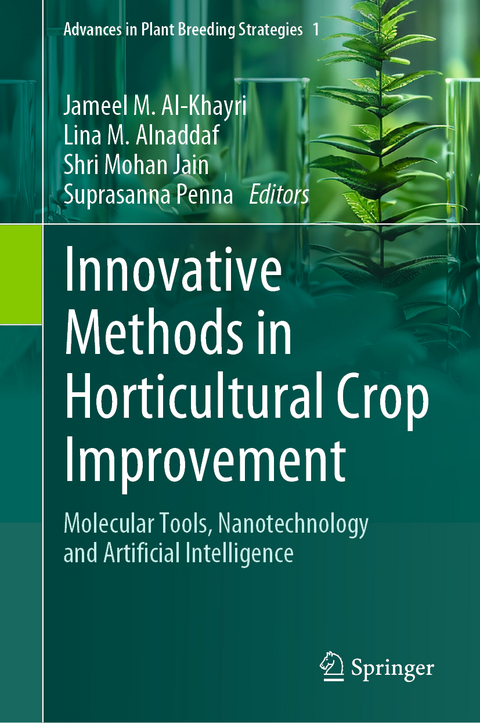
Innovative Methods in Horticultural Crop Improvement
Springer International Publishing (Verlag)
978-3-031-61080-6 (ISBN)
This book focuses on recent advances in Molecular Tools, Nanotechnology and Artificial Intelligence to monitor, manage and improve horticultural crops in terms of plant growth, nutrient deficiency, toxicity, diseases, abiotic stress, soil amendments and agrochemicals entering the surrounding environment. The book consists of 11 chapters grouped in 3 parts. Part I Nanotechnology and Artificial Intelligence, Part II Monitoring Abiotic and Biotic Stress, Part III Genetic Engineering and Genomics.
This book provides an overview of nanotechnology and omics used to improve the productivity of crops and sustainability in the future. It also describes the basic structures of six popular artificial intelligence techniques and their applications in horticultural crop improvement. The book presents molecular techniques such as molecular markers, genome sequencing, genome editing and genetic modification that are considered efficient tools to achieve the goals of plant breeders in horticultural crop improvement programs. Chapters are written by globally recognized scientists and subjected to a rigorous review process to ensure quality presentation and scientific precision. Each chapter begins with an introduction that covers similar contexts and includes a detailed discussion of the topic accompanied by high-quality color images, diagrams and relevant details and concludes with recommendations for future study directions in addition to a comprehensive bibliography.
Professor Jameel M. Al-Khayri is specialized in plant biotechnology and currently affiliated with the Department of Agricultural Biotechnology, King Faisal University, Saudi Arabia. He received B.S. in Biology in 1984 from the University of Toledo, M.S. in Agronomy in 1988, and Ph.D. in Plant Science in 1991 from the University of Arkansas. He is a member the International Society for Horticultural Science and Society for In Vitro Biology as well as the National Correspondent of the International Association of Plant Tissue Culture and Biotechnology. For the last three decades, he dedicated his research efforts to date palm biotechnology. He has authored over 70 research articles in referred international journals, 30 chapters, and edited several special issues of international journals. In addition, he edited 20 reference books on date palm biotechnology, genetic resources, genomics and advances in plant breeding strategies. He has been involved in organizing international scientific conferences and contributed numerous research presentations. In addition to teaching, students advising and research, he held administrative responsibilities as the Assistant Director of Date Palm Research Center, Head of Department of Plant Biotechnology and Vice Dean for Development and Quality Assurance. Dr. Al-Khayri served as a Member of Majlis Ash Shura (Saudi Legislative Council) for the 2009-2012 term. Presently, he is maintaining an active research program focusing on in vitro culture approaches, secondary metabolites production, genetic engineering and mutagenesis to enhance crop tolerance to abiotic and biotic stress.
Associate Professor Lina M. Alnaddaf is specialized in biotechnology and molecular biology at the Department of Field Crops, College of Agriculture, Albaath University, Syria. Obtained B.S. in Agricultural Engineering in 2001 from Albaath University, M.S. in field crops in 2010, and Ph.D. in field crops in 2013 from Tishreen University. My research expertise dedicated to biotechnology, molecular biology, and nanotechnology. Published 41 research articles in international journals in addition to 11 book chapters and 2 edited books. Reviewer for several international journals on biotechnology and agriculture. Participated in the organizing and scientific committees of local and international scientific conferences and contributed numerous research presentations. In addition to teaching, graduate students advising and conducting funded research projects, currently conducting some research projects on biotechnology and nanotechnology focusing on: nanoparticles synthesis by safe, cheap and environmentally friendly methods as well as their application in agriculture, medicine and industry.(Agriculture: effects of nanoparticles on wheat, Chickpea, Faba bean, fenugreek and Thyme, Medicine: their effect on some bacterial species, Industry: manufacture of sunscreen and antibacterial creams, in addition to humidity sensor).
Professor Shri Mohan Jain is a Consultant and Plant Biotechnologist, Department of Agricultural Sciences, University of Helsinki, Helsinki, Finland. Received M. Phil, 1973 and Ph.D., 1978, Jawaharlal Nehru University, New Delhi, India. He was a postdoctoral fellow in Israel, USA, and visiting scientist/Professor in Japan, Malaysia, Germany, and Italy. He served as a Technical Officer, Plant Breeding, and Genetics, International Atomic Energy Agency (IAEA), Vienna, Austria, 1999-2005 when the agency was awarded Nobel Peace Prize, 2005. He is on the editorial Board of Euphytica, In Vitro, Propagation of Ornamental Plants; a reviewer in Plant cell and organ culture, Plant cell reports, and Plants, His publications are more than 170 peer-reviewed journals, book chapters, and conference proceedings, and edited 68 books; invited speaker and acted as a Chairperson in several international conferences worldwide. He is a former consultant to the I
Chapter 1: Nanotechnologies and omics: A way forwardNanotechnologies and omics: A way forward.- Chapter 2: Artificial intelligence in agriculture.- Chapter 3: Molecular techniques for improvement of abiotic stress tolerance in plants.- Chapter 4: Molecular techniques for improvement of biotic stress tolerance in plants.- Chapter 5: Influence of Nanomaterials on Physiology and Antioxidant Defense Activities in Plants under Abiotic Stress Conditions.- Chapter 6: Plant genetic engineering: Nanomaterials-based delivery of genetic material.- Chapter 7: Detection of Genetically Modified Crops with Biosensors.- Chapter 8: Advances in genomics for biofortification.- Chapter 9: Bioinformatics and functional genomics.- Chapter 10: Genome Editing: Revolutionizing Horticultural Crops Improvement.- Chapter 11: Metabolic engineering for the overproduction of plant secondary metabolites: Alkaloids.
| Erscheinungsdatum | 03.10.2024 |
|---|---|
| Reihe/Serie | Advances in Plant Breeding Strategies |
| Zusatzinfo | XIV, 337 p. 37 illus., 31 illus. in color. |
| Verlagsort | Cham |
| Sprache | englisch |
| Maße | 155 x 235 mm |
| Themenwelt | Weitere Fachgebiete ► Land- / Forstwirtschaft / Fischerei |
| Schlagworte | biosensors • Horticultural Crops • Molecular Techniques • nanosensors • sustainable agriculture |
| ISBN-10 | 3-031-61080-6 / 3031610806 |
| ISBN-13 | 978-3-031-61080-6 / 9783031610806 |
| Zustand | Neuware |
| Informationen gemäß Produktsicherheitsverordnung (GPSR) | |
| Haben Sie eine Frage zum Produkt? |
aus dem Bereich


